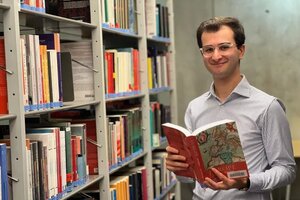Programme structure
On this page, you get an overview of the structure of our Master of Arts programme in European Studies (called MAPES). You can see which courses are given each semesters and when during the semester (approximately) they are given.
If you want to learn more about a course, click on it to go to the course page. There you will find information about the course content as well as a link to the course syllabus, current schedule and reading lists.
Semester 1
MAPES is introduced by a course on historical, cultural and normative perspectives on Europe. Among the subjects taught on the course are the influence of Christianity on Europe, the concept of the nation-state, the ideas of the Enlightenment and of humanism, the view of the individual and his or her freedom and rights, and the significance and interrelationship of different democratic values, such as freedom of expression, tolerance and equality before the law.
The following second course provides you with an in-depth understanding of the political institutions and processes that have shaped and are shaping the European project. A special focus is placed on the European Union and on integration theories that explain the post-war development.
Courses:
- The Meaning of Europe: Culture, Values and Identity, 15 ECTS
First half of the semester, September - October - European Governance, 15 ECTS
Second half of the semester, November - mid-January
Semester 2
The second semester starts with a course on relevant methods and theories for humanities-oriented European studies and ends with a course on project management and communication, where you will get to develop and train various practical skills required for the planning and implementation of an EU financed project.
- Theory and Methodology, 15 ECTS
First half of the semester, mid-January - March - Project Management and Communication Strategies, 15 ECTS
Second half of the semester, April - early June
Semester 3
Internship, 30 ECTS
During the third semester you have the opportunity to begin shaping your professional identity as a humanistic European studies specialist by practically applying the skills and theoretical knowledge you have gained through your education during a qualified work placement at an authority, organization, or company. You will find and apply to the internship yourself, but the programme provides you with useful tips from our long list of former student's placements, as well as practical guidance in the application process from the faculty Careers Services.
- European Studies: Internship, 30 ECTS
September-January, 18-20 weeks
Elective courses, 30 ECTS
Another option for this semester is to broaden or specialize your education by taking one or two optional courses on a subject that you find interesting or beneficial for your future. This could be a course offered by our own department, but it could also be a course in another area of studies given within our faculty or even by another university, as long as it is relevant for the profile of the programme.
Electable courses given by our own department:
Semester 4
During the final semester you get to complete an independent research project in which you'll design and carry out a study relevant to European Studies. The project will take a multidisciplinary approach, combining theories and methods from the humanities and social sciences.
You'll be responsible for formulating your own research problem, selecting an appropriate method, gathering and analysing theoretical and empirical material, and presenting your results in a written report. Although you'll work independently, you'll receive guidance and feedback from a department-appointed supervisor throughout the research process.
This is an opportunity to develop your research skills and explore the complexities of European Studies. It will require a significant investment of time and effort, but you'll emerge with valuable experience in independent research and multidisciplinary approaches to complex topics.

